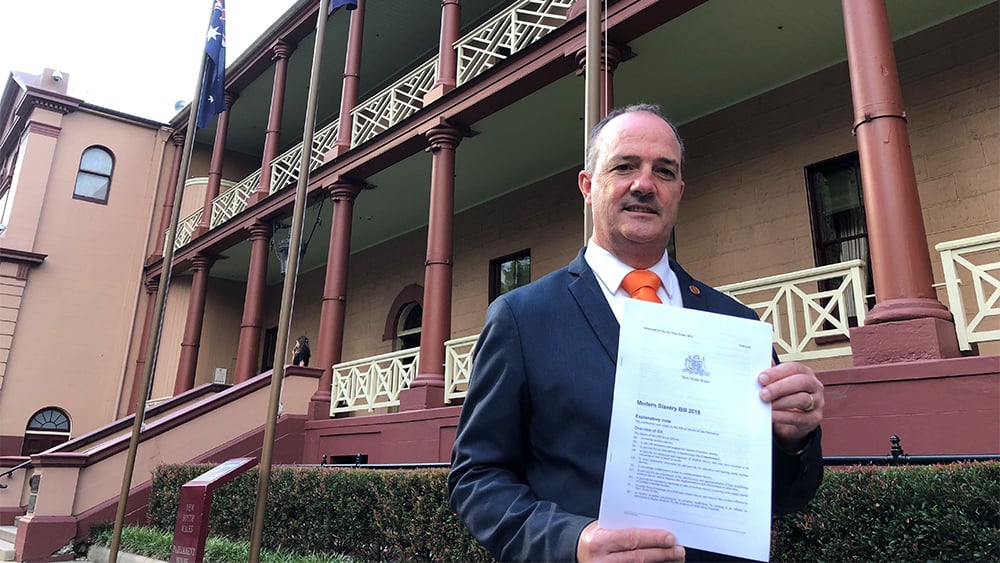Slavery is real and we will fight it, says NSW parliament
Big businesses to monitor supply chains
Australia’s first Modern Slavery Bill passed through the NSW Legislative Council last night.
Paul Green, member for the Christian Democratic Party who personally spearheaded the legislation, hailed the state’s upper house for acknowledging this surprising blight on our society and drawing “a line in the sand.
“In Australia there is well over 4000 cases of human trafficking with many remaining hidden in plain sight. The evidence is in,” he said after the bill passed.
The Modern Slavery Bill 2018 confronts slavery and slavery-like practices such as servitude, forced labour, debt bondage, organ trafficking, deceptive recruiting as well as forced marriage and childhood brides. If the new law is passed by the Legislative Assembly, it will require businesses with a turnover of more $50 million to monitor their supply chains and report to a new Anti-Slavery Commissioner,
The passage of the Bill marks a turning point in a surprising debate about whether human trafficking exists in our society.
“I have committed to doing everything I can to see this blight removed from our society.” – Paul Green
There had been surprises in the submissions to the Human Trafficking Select Committee that led to the Bill. For example, the Sex Workers Outreach Project maintained it they had never come across a trafficked sex worker, or even a sex worker who knew of one.
But the campaigning group Collective Shout provided evidence that sex workers are being trafficked into Australia, citing the case of a brothel in the Sydney suburb of Willoughby that forced workers on student visas to work 20-hour days to pay off so-called “debts”.
Collective Shout also pointed to a US State Department report finding that in Australia: “Women and girls are sometimes held in captivity, subjected to physical and sexual violence and intimidation, manipulated through illegal drugs and obliged to pay off unexpected or inflated debts to their traffickers.”
“Women and girls are sometimes held in captivity, subjected to physical and sexual violence.” – US State Department
As Labor Member Greg Donnelly put it in the final debate, the mood of the house was that “human trafficking is right here, right now.”
Green thanked many Christian-based agencies for their submissions and support including Hagar (an international agency protecting vulnerable women), the Sydney Catholic Archdiocese Anti Slavery Taskforce, Anglican Archbishop Glenn Davies and The Salvation Army.
In hard-hitting evidence the Salvos gave case studies that showed the need for anti-slavery legislation, such as this one:
“One young woman, in a pair of sisters, accommodated by a partner youth service, disclosed the confidential address of her sibling to her family, who was actively looking for her following her disclosure of forced marriage. When reporting this to New South Wales Police, they did not have any specific criminal legislation that could apply to this unique situation. It was decided that should the family make an attempt to access the property and the individual at risk, New South Wales Police would utilise a ‘trespassing offence.’ ”
The state government opposed a number of amendments to the Bill, which would have obliged it to monitor its supply chain along with commercial companies. But the Bill passed with Christian Democrats, Greens and Labor voting together. The Modern Slavery Act now passes to the lower house, which will determine if it becomes law.
“This is the first step and I do hope for the full support of the government in the weeks to come,” Green said.
“I have committed to doing everything I can to see this blight removed from our society. As [anti-slavery campaigner] William Wilberforce once said, ‘You may choose to look the other way but you can never say again that you did not know.'”
Editors note: Earlier this year the Sydney Catholic Archdiocese promised to slave-proof its supply chains. The new Modern Slavery Act will not require non-governments organisations such as churches to do this, but voluntary monitoring to make sure slavery is not involved in the goods and services we use is a good example other churches should follow.
Email This Story
Why not send this to a friend?



